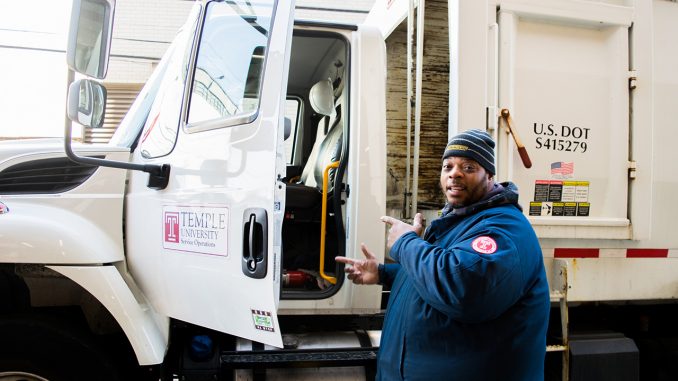
Michael Williams Sr. and Lance King make up the two-man team that hauls, drives and disposes of the trash at Temple University. Their day begins at 6 a.m. when they rev up the trash truck and ends around 3 p.m., or whenever the last of the mess has been dealt with.
The two are drivers for Temple’s Service Operations Department, a team of about 13 workers who manage everything from garbage disposal to transportation of students and athletic teams. Williams and King do a little of each task, but primarily collect trash.
Each week, the men collect approximately 15 tons of trash from dumpsters stationed behind university buildings on Main Campus, Temple University Hospital and Ambler Campus, said William Majzik, the assistant facilities manager. Dumpsters hook on the back of the truck while tipsters are manually tipped in.
The crew is not legally responsible for cleaning up student residences and homes in the area around Main Campus, which falls outside of their jurisdiction. But due to the large accumulation of waste from college parties or move-out days, the crew is sometimes called upon by Temple Police to also sweep up “Temple-affiliated neighborhood trash,” Majzik said.
One of the biggest obstacles the crew faces is rodents, said Majzik, who has worked at Temple for 20 years. Back in the early 2000s, this meant mice. Now, “rodents” encapsulate a larger range of creatures, including hungry rats that crawl in and curl up in the back of the truck, he said.
“You really can’t exterminate a trash truck,” Majzik added. “They can come from anywhere.”
When dealing with rats, William Parker, who worked as a driver this fall, said, “We run.”
“Fast,” added Christopher Rhone, his former partner.
Parker recently advanced to a general mechanic position at Temple after working in the Service Operations Department for 17 years, and Rhone is taking a medical leave, Majzik said.
Williams and King quickly transitioned to fill Parker’s and Rhone’s shoes. King has worked at Temple for 13 years and has been driving the trash truck for five weeks, while Williams has worked at Temple for 20 years, spending his time in Grounds Maintenance.
“Work is work,” Williams said. “It’s a little dirtier, that’s about it.”
Both men grew up in Philadelphia — Williams in North Philadelphia and King in West Philadelphia — and said the streets used to be much cleaner.
“When I was growing up, Philly was clean,” Williams said. “People took more pride in the front of their homes. …Nowadays, not so much.”
Williams’ neighbors swept their front steps with brooms every Saturday morning, he added.
Octavius Green Jr., a truck driver in the Service Operations Department and president of the Brotherhood of University Employees 612, added students who don’t follow the city’s trash collection schedule or discard mattresses during move-out days contribute to this heightened trash accumulation.
“If you take a walk up 16th Street off of Cecil B. Moore on any given non-trash day, it looks like a war zone,” Green said.
BUE 612 is a worker’s union that advocates for fair wages and working conditions of the crew. It is one of the oldest unions at Temple, starting in the 1950s, Green said.
The children of union members receive free tuition at Temple.
For Williams — who has a daughter graduating in May and a son starting as a freshman in the fall — this was played a major role in his decision to work at Temple. While it was not a deciding factor for King, it is something he is very appreciative of now, King said.
“It’s free,” King added. “I can’t stress that enough.”
The union is successful because the members advocate for each other, the men said.
“If you make a complaint, in years past, it might have fallen on deaf ears,” Green said. “With us, it’s not going to fall on deaf ears.”
Williams and King’s workplace fosters a brotherhood and community of its own. In addition to advocating for each other through their union, some of the men live in the same neighborhoods and know each other’s families.
“This department is like a closed fist,” Williams said.



Be the first to comment